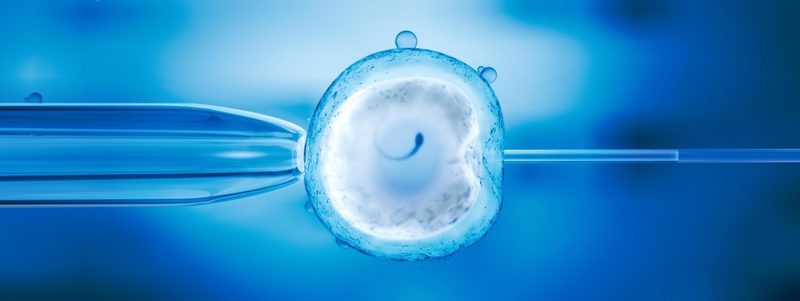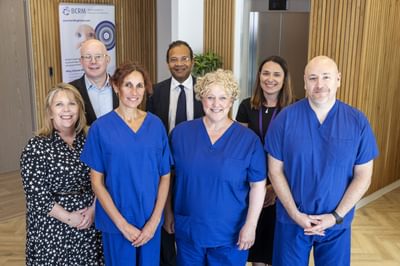ICSI is a specialist technique carried out in our embryology laboratory. Instead of placing many sperm around the egg, our experts choose a single healthy-looking sperm and inject it directly into the egg with a needle finer than a strand of hair.
The steps leading up to ICSI are the same as with IVF. You’ll take medication to stimulate your ovaries so more eggs can develop. When scans show the eggs are mature, they’re collected under sedation and taken to the lab for ICSI treatment.
With IVF, eggs and sperm are mixed and left to fertilise, but with ICSI, fertilisation is given extra help by injecting one sperm into each mature egg. From this point, embryos begin to grow in the same way as IVF.
You can watch the injection process in the video below.
If sperm needs to be retrieved surgically, this can be done before or on the day of egg collection. Our andrology and embryology team will always select the healthiest-looking sperm, giving each egg the strongest chance of developing into a healthy embryo.
After the ICSI procedure, our team will carefully monitor embryo development in the laboratory. We’ll update you on how many eggs have been fertilised and how the embryos are growing. When the time is right, we’ll discuss the best embryo to transfer and whether any others can be frozen for future use.
You’ll also receive clear guidance on what to expect after your transfer, including any medication to support implantation. We’ll be here to answer your questions and make sure you feel supported at every stage.
When might I need ICSI?
ICSI is often recommended when the sperm is less likely to fertilise the egg naturally.
It may be recommended if:
A semen analysis shows a low sperm count, poor motility (movement) or high numbers of abnormal sperm shape
There’s no sperm in the semen (azoospermia), or you’ve had a vasectomy and need surgical sperm recovery (SSR)
The tubes that normally carry sperm are blocked or not working as they should
Retrograde ejaculation occurs (when sperm travel backwards into the bladder)
You’re using frozen donor eggs or previously frozen eggs in your treatment
Immune-related conditions affect sperm quality, making fertilisation more difficult
In each of these situations, ICSI provides sperm with extra help to fertilise the egg, improving the chances of developing healthy embryos.

Other types of ICSI: Physiological ICSI (PICSI)
Alongside standard ICSI, we also offer physiological intra-cytoplasmic sperm injection (PICSI). This technique helps our embryologists select sperm that are less likely to have DNA damage, which may help healthy embryo development.
PICSI may be recommended you’be been found to have a high proportion of DNA-damaged sperm in your sample or if you’ve experienced recurrent miscarriage. By selecting sperm that are less likely to have DNA damage, PICSI may reduce the risk of miscarriage and potentially improve outcomes.
Your consultant will discuss whether PICSI could be suitable for you. It’s available as an addition to a standard ICSI cycle, at a charge of £270 on top of the ICSI procedure cost of £1,380. Our regulator, the HFEA, does not routinely recommend the use of PICSI as there is insufficient evidence of benefit.
Why choose BCRM for your ICSI treatment?
At BCRM, we understand that choosing fertility treatment is a deeply personal and important decision. Our team of leading fertility specialists, embryologists and nurses is here to guide you every step of the way, combining world-class expertise with truly compassionate care.
We’re proud to achieve some of the highest success rates in the region. For example, our IVF and ICSI success rate in a fresh cycle is 19% higher than the national average. With our state-of-the-art laboratories, tailored treatment plans and commitment to emotional support, you can feel confident and cared for throughout your journey.
Whether you’re beginning fertility treatment for the first time or continuing after previous challenges, we’ll work closely with you to give you the best possible chance of success.
Begin your ICSI journey with BCRM
If you’d like to speak with our friendly team or book a consultation, we’re here to help.
Call us on 0117 259 1159 or complete the enquiry form below, and we’ll help you take the first steps on your fertility treatment journey.
Alternatively, you can contact us today for more information on ICSI fertility treatment and how BCRM can support you.
Frequently asked questions (FAQs) about ICSI
It’s natural to have questions when considering ICSI. Here are some of the ones we’re asked most often, to help you feel more informed about what to expect.
Does ICSI improve IVF success rates?
ICSI provides sperm with extra help to fertilise the egg, which can make a significant difference when there are issues with sperm quality. Once fertilisation happens and embryos are created, the chances of pregnancy are generally similar to those seen with standard IVF.
What are the risks of ICSI?
ICSI is a safe and well-established treatment. Very occasionally, an egg may be damaged during the injection, but this is rare. Like standard IVF, there’s a small increased risk of multiple pregnancy or ectopic pregnancy. Our team will discuss these risks with you in detail and take every precaution to make your treatment as safe as possible.
There is some evidence to suggest that ICSI may carry a slightly higher risk of inherited abnormalities compared to standard IVF. However, it’s thought that these are small increases on a low background risk, which, in part, may be related to the fertility issues themselves rather than the treatment. Your consultant will discuss these risks with you in more detail.
How many embryos are created with ICSI?
The number of embryos you may have depends on how many eggs are collected and the quality of the sperm on the day. Not every egg will fertilise, but when sperm factors are a concern, ICSI can increase the number of embryos available compared with standard IVF.
How much does ICSI cost?
At BCRM, ICSI costs £1,380 in addition to a standard IVF cycle. If your consultant recommends PICSI, this is available for an additional £270. We’ll always explain costs clearly, so you know exactly what’s included before starting treatment.
We also offer flexible finance options, allowing you to spread the cost of your treatment and access the care you need.



